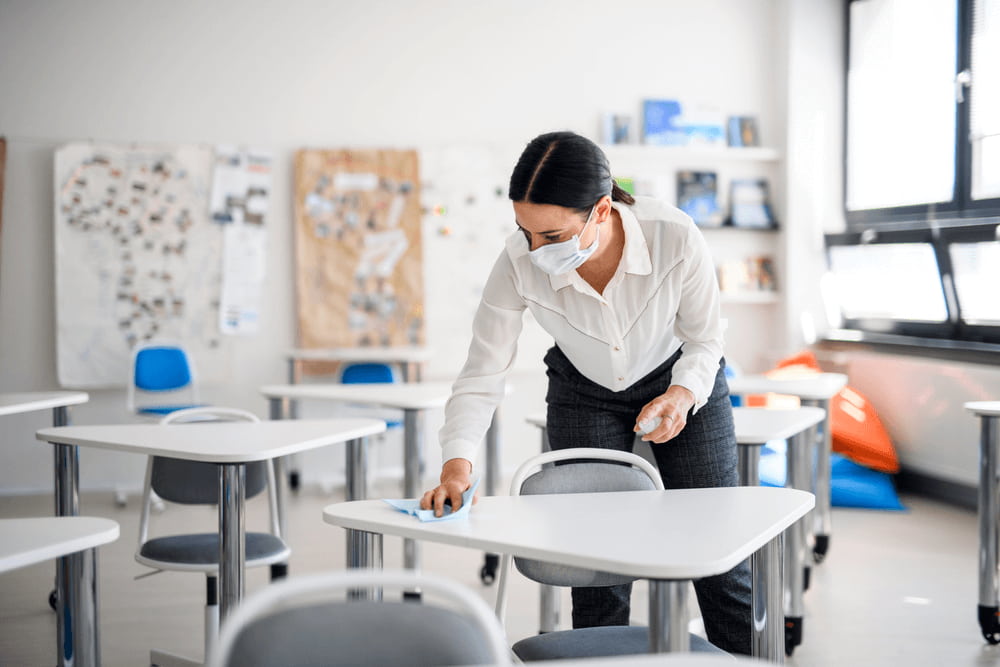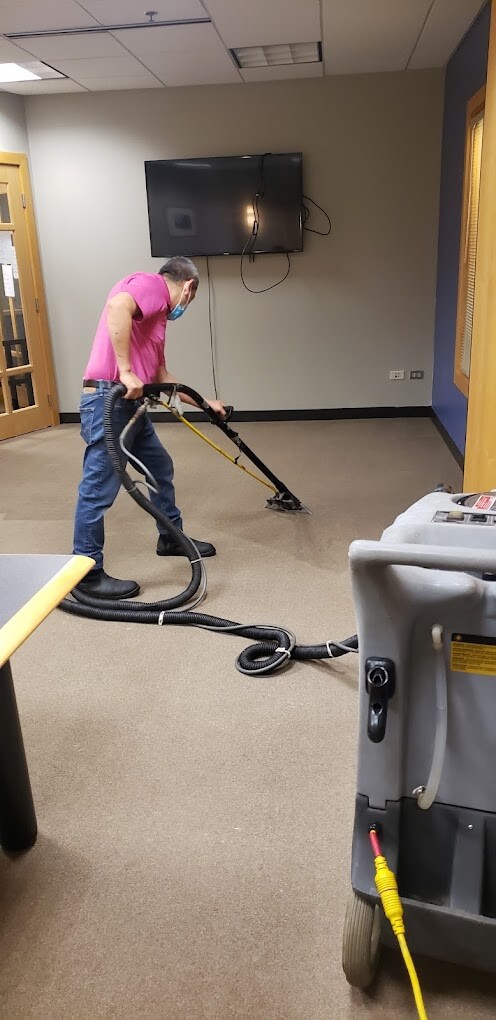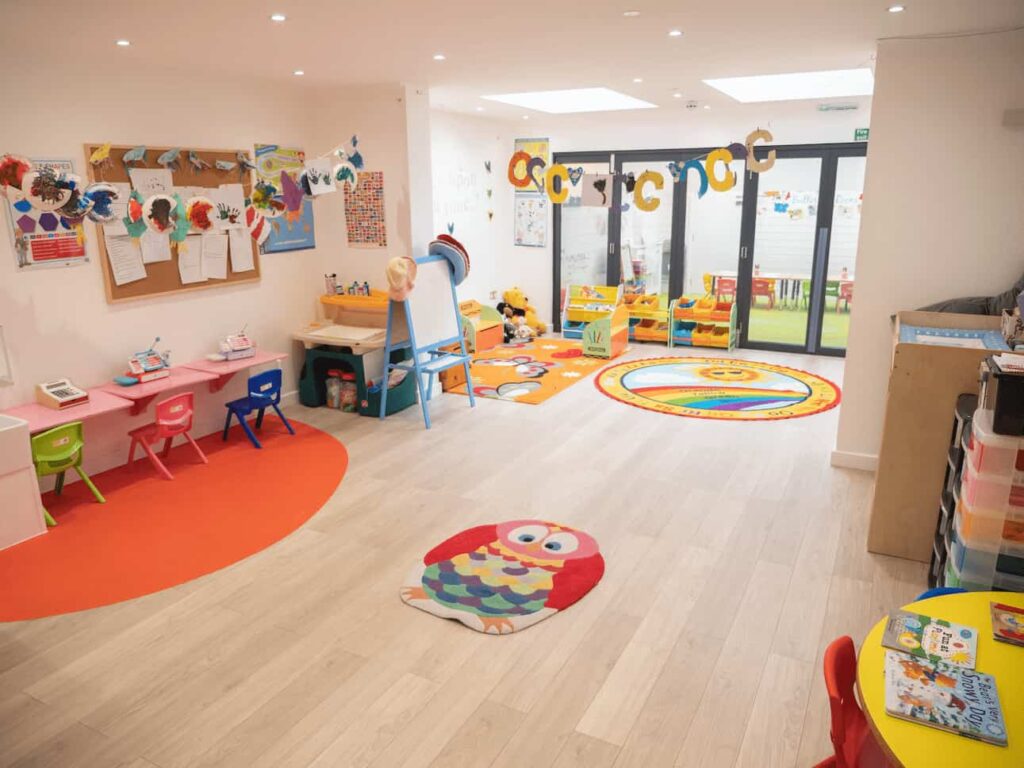Daycare centers are more than just a place for children to spend their day while parents are at work; they are environments that play a pivotal role in shaping young minds and nurturing their growth.
But as wonderful as daycare centers are, they can also be a hotspot for germs, bacteria, and other nasties. With children constantly touching surfaces, toys, and each other, the spread of infections can happen fast. This is where professional cleaning comes in.
Keeping a daycare center clean isn’t just about tidying up—it’s about maintaining a safe, healthy environment where children can learn, play, and grow.
Professional cleaning services bring expertise and techniques specifically designed to meet the unique challenges of keeping these spaces clean and free from harmful contaminants.
In this article, we’ll explore why professional cleaning is critical for daycare centers, discuss the importance of using non-toxic cleaning products, and look at the essential protocols that help protect children’s health and well-being.
The Importance of Professional Cleaning in Daycare Centers
Daycare centers are bustling environments. Whether it’s snack time, arts and crafts, or outdoor play, children are constantly engaged with their surroundings.
And while this is wonderful for their development, it also creates an environment where germs can spread quickly. From the moment kids enter the daycare to the time they leave, they touch countless surfaces—tables, toys, and even each other.
This is where professional cleaning services become indispensable. Unlike standard cleaning, professional services focus not only on making the place look tidy but on deep cleaning and sanitizing areas to prevent the spread of illnesses.
Professional cleaners understand which areas are most at risk for harboring germs and use specialized cleaning techniques to keep those spaces safe.
Cleaning for Children’s Environments: Why It’s Different
Cleaning a daycare is much different than cleaning an office or home. For one, children are much more vulnerable to germs than adults. Their immune systems are still developing, making them more susceptible to infections and illnesses.
On top of that, children are less likely to practice good hygiene—think about how many times kids put their hands in their mouths, touch their faces, or pick up a toy and immediately drop it.

Professional cleaners in daycare settings are trained to handle these unique challenges. They focus on high-touch areas like doorknobs, tables, and play equipment, ensuring that these surfaces are regularly disinfected.
They also use cleaning methods that reduce the risk of cross-contamination, which can occur when germs spread from one area or surface to another.
- Disinfecting Toys and Play Areas
One of the most important aspects of daycare cleaning is ensuring that toys and play areas are kept clean and germ-free. Toys are a huge part of a child’s day at daycare, and because they’re often shared between many children, they can be a major source of infection.
Why Disinfecting Toys is Essential
Children are naturally curious, and they explore the world by touching, tasting, and feeling things. Unfortunately, this curiosity also means that toys can get covered in saliva, mucus, and other bodily fluids.
If not cleaned properly, toys can become a breeding ground for harmful bacteria and viruses, which can quickly spread throughout the daycare center.
Professional cleaners follow specific protocols when it comes to disinfecting toys. This includes using safe, non-toxic cleaning products that are strong enough to kill germs but gentle enough to be safe for children.
Many daycare centers also have a policy of rotating toys, allowing some to be cleaned while others are in use.
- Cleaning Play Areas
Play areas, especially those that involve climbing, jumping, and crawling, can harbor germs on surfaces like mats, jungle gyms, and slides. Professional cleaning ensures that these areas are regularly sanitized, especially since children often touch their faces or mouths after playing.
Whether indoors or outdoors, play areas need extra attention to reduce the risk of spreading infections.
Cleaning Protocols in Daycare Settings
Maintaining cleanliness in a daycare setting requires more than just a quick sweep or mop. There are specific cleaning protocols that must be followed to ensure the safety and well-being of the children. These protocols go beyond what a standard cleaning routine would entail.
1. High-Touch Surface Cleaning
High-touch surfaces in a daycare, like countertops, chairs, light switches, and toys, need to be cleaned and disinfected multiple times a day. This frequent cleaning helps to minimize the spread of germs.
Professional cleaners are trained to pay extra attention to these areas, using the appropriate disinfectants and techniques to ensure thorough cleanliness.
2. Bathroom Cleaning
Bathrooms in daycares see a lot of use and can be a major source of bacteria if not cleaned properly. Professional cleaning services ensure that sinks, toilets, and floors are regularly sanitized and that any messes are promptly dealt with.
They also restock supplies like soap and paper towels, ensuring that children have the resources they need to maintain personal hygiene.
3. Kitchen and Dining Areas
If the daycare center provides meals or snacks, the kitchen and dining areas require special attention. Professional cleaners disinfect countertops, tables, and chairs, ensuring that these surfaces are free from foodborne bacteria.
Floors in these areas also need to be mopped frequently to prevent slips and to remove any food debris that could attract pests.
4. Nap Areas
Children spend a portion of their day napping, and these quiet spaces also need to be kept clean. Professional cleaners regularly sanitize cots, mats, and bedding. If bedding is provided by the daycare, it must be washed and changed frequently to prevent the spread of lice, germs, and allergens.
Importance of Non-Toxic Cleaning Products
One of the most critical aspects of daycare cleaning service is the use of non-toxic cleaning products. Traditional cleaning chemicals, while effective at killing germs, can sometimes contain harmful substances like bleach or ammonia.
In an environment where children spend hours playing, touching surfaces, and putting things in their mouths, these harsh chemicals can be dangerous.
Why Non-Toxic Cleaners Matter
Children are more sensitive to chemicals than adults. Exposure to toxic cleaning agents can cause skin irritation, respiratory problems, and allergic reactions.
Non-toxic cleaning products are made from natural or eco-friendly ingredients that are just as effective at eliminating germs but without the harmful side effects.
Many professional cleaning services are now using green cleaning products specifically designed for environments like daycares. These products are safe for children, free from harmful chemicals, and also better for the environment.
This means daycare centers can maintain a high standard of cleanliness without compromising the safety of the children.
Allergen Control in Daycare Centers
For children with allergies, daycare can be a challenging environment. Dust, pet dander, mold, and other allergens can lurk in carpets, curtains, and upholstery. Professional cleaners take steps to control these allergens, ensuring that the air quality in the daycare remains high and free from triggers.
Carpet Cleaning

Carpets can trap dust, allergens, and bacteria, especially in high-traffic areas where children play and sit. Professional cleaning services use vacuum cleaners with HEPA filters and non-toxic carpet cleaning solutions to remove dirt and allergens from deep within the fibers.
This regular cleaning not only keeps the carpet looking clean but also reduces the likelihood of allergy flare-ups.
Air Quality Management
Indoor air quality is often overlooked, but it’s essential for the health of both children and staff. Professional cleaning services often incorporate air filtration systems and air purifiers to ensure that airborne allergens are minimized. By improving air quality, daycare centers become healthier spaces for everyone.
The Role of Professional Cleaners in Maintaining Health and Safety
Hiring professional cleaners for a daycare center goes beyond just making the place look nice. It’s about creating a safe, healthy environment for children to play and learn.
Professional cleaners understand the specific needs of a daycare and can tailor their cleaning protocols to address the unique challenges these environments present.
- Specialized Training and Equipment
Professional cleaning services have the training and equipment necessary to tackle germs and bacteria in ways that regular cleaning staff may not.
They use hospital-grade disinfectants, specialized vacuums, and tools designed for deep cleaning. This ensures that every nook and cranny of the daycare is cleaned thoroughly, reducing the risk of illness spreading.
- Regular, Scheduled Cleanings
Consistency is key when it comes to keeping a daycare clean. Professional cleaners create cleaning schedules that fit the needs of the daycare, ensuring that high-traffic areas are cleaned daily and deep cleaning is done regularly. This helps to maintain a consistently healthy environment for the children.
Conclusion
Professional cleaning is vital for daycare centers because it creates a safer, healthier environment where children can thrive. From disinfecting toys and play areas to ensuring that high-touch surfaces are germ-free, professional cleaners play a crucial role in reducing the spread of infections and maintaining cleanliness.
Additionally, the use of non-toxic cleaning products and regular allergen control ensures that the daycare remains a safe place for all children, even those with sensitivities.
FAQs
-
How often should a daycare center be professionally cleaned?
Daycare centers should be cleaned daily, with deeper cleanings scheduled weekly or monthly, depending on the level of use and traffic.
-
Why are non-toxic cleaning products important in daycares?
Non-toxic cleaning products are safe for children, reducing the risk of skin irritation, respiratory issues, and allergic reactions that can come from harsh chemicals.
-
How do professional cleaners disinfect toys in a daycare setting?
Professional cleaners disinfect toys using safe, non-toxic products designed to kill germs without harming children. Some toys may also be cleaned with UV light sanitizers or washed with hot, soapy water.
-
What are high-touch areas in a daycare?
High-touch areas include surfaces like doorknobs, tables, chairs, light switches, and toys that are frequently touched by children and staff throughout the day.
-
How do professional cleaning services improve indoor air quality in a daycare?
Professional cleaning services use vacuums with HEPA filters, air purifiers, and eco-friendly cleaning products to reduce allergens, dust, and pollutants, improving indoor air quality.

